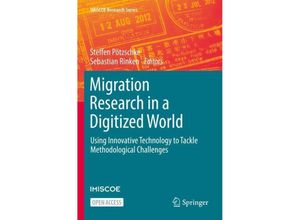This open access book explores implications of the digital revolution for migration scholars'
methodological toolkit. New information and communication technologies hold considerable
potential to improve the quality of migration research by originating previously non-viable
solutions to a myriad of methodological challenges in this field of study. Combining
cutting-edge migration scholarship and methodological expertise the book addresses a range of
crucial issues related to both researcher-designed data collections and the secondary use of
big data highlighting opportunities as well as challenges and limitations. A valuable source
for students and scholars engaged in migration research the book will also be of keen interest
to policymakers.



